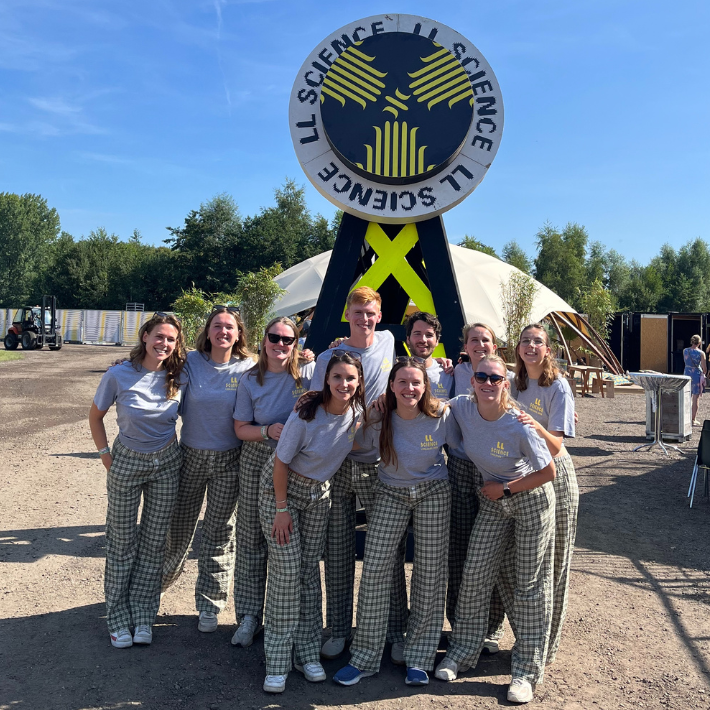The afterparty of the festival jet lag
&width=710&height=710)
Maaike van der Rhee (PhD candidate at Erasmus MC): "We looked at “festival jet lag”. We know that the biological clock and sleep are very important for your health. Your biological clock normally determines when you feel alert, when you feel tired and when you can sleep well. But at a festival like Lowlands, you disrupt your biological clock by sleeping little and often only doing so in the early hours of the morning. We were very curious to see what effect this disruption has on alertness and driving ability. Together with Ward Vleeshouwers and Gali Albalak (PhD candidates at LUMC) and Demy van Gilst (PhD candidate at Erasmus MC), we took the initiative to investigate this at Lowlands. Ultimately, we were able to collect a lot of data over three days with a team of researchers."
Research
Ward: "We used a questionnaire to find out how the participants had slept in the nights prior to the study and how they normally sleep outside the festival environment. This gave us insight into the effect of the festival on the participants' sleep. After this, the participants took a reaction test. This allowed us to measure their alertness and responsiveness. It also allowed us to see whether the participant's sleep deficiency had an effect on their performance and whether there was a difference between morning and evening people."
"We also had a driving simulator in which participants could drive a short distance in a virtual driving environment,’ Ward continues. ‘During the simulation, a number of things happened that the participant had to respond to, such as brake when a dog suddenly crossed the road."
Maaike: "We asked all interested participants about their use of substances such as alcohol and drugs. This allows us to factor their impact into the results. Ultimately, we want to incorporate the results into a scientific paper. We will be analysing the data in the coming period."
Sleep drunk
"In addition to the research, we also wanted to inform people about what happens when you are sleep deficient. If you have only slept for a short time, it affects your alertness. This can be directly compared to the influence of alcohol. Suppose you have slept for six hours, then on average that is equivalent to the effect of two glasses of alcohol. And if you sleep for three hours, that is equivalent to four or five glasses. We have tried to explain the term “sleep drunk” as clearly as possible," says Maaike.
Ward: "Sleep deficiency can also have consequences for road safety. That's something that the people we spoke to don't normally think about. For example, they took alcohol into account, but to a lesser extent short nights. That made people took a moment to reflect."
Huge interest
Maaike: "It was a unique opportunity to test sleep deficiency and its impact on alertness and driving ability in such a large group ‘in the wild’ at Lowlands Science. This is also being researched in laboratories, but these are very controlled settings. You rarely have such a large group, where people do not naturally show that behaviour. At festivals, people already sleep less on their own. I think every researcher who works with people knows how difficult it is to find people who want to participate in your study. Sometimes it takes months or even years."
"At Lowlands, it was a different world,’ Maaike continues. ‘From the start of the project, the organisers of Lowlands Science recommended that we take the visitor's experience into account. That has paid off: thanks to the inviting research setting, people just walked in and asked what kind of research we were doing, and they were genuinely interested in what you are doing."
Highly recommended
"Conducting research at a festival is highly recommended for researchers if you have a topic that is suitable for this. You can get a lot of attention for your research. It was wonderful to meet so many people and talk about science, with the music from the stages playing in the background," says Ward.
Maaike: "It's especially nice that it's a different way of doing science. You think about the visitor experience and the entertainment factor much earlier on. That offers a lot of possibilities and is good training for scientists. It provides good feedback and media attention. For example, we will soon be featured on BNR, we were mentioned in the Lowlands daily newspaper, and the Universiteit van Nederland is doing a podcast about our research. I'm hooked and would love to do this again."
BioClock Consortium
The BioClock Consortium consists of a network of universities, social partners, local authorities and other stakeholders. The LUMC is the coordinator of the partnership. The partners have a common goal: to understand how we can keep our biological clock healthy in a modern society that runs 24 hours a day.
Science outreach brings scientific research closer to everyone. We share knowledge with a wide audience through schools, museums, festivals and online platforms. In this way, we spark curiosity and inspire others to take a deeper interest in science.
Main image: private archive. Photos in the article: Alex Heuvink